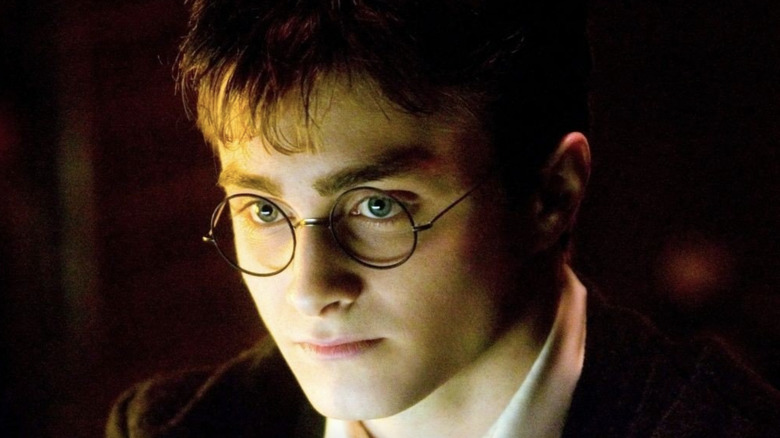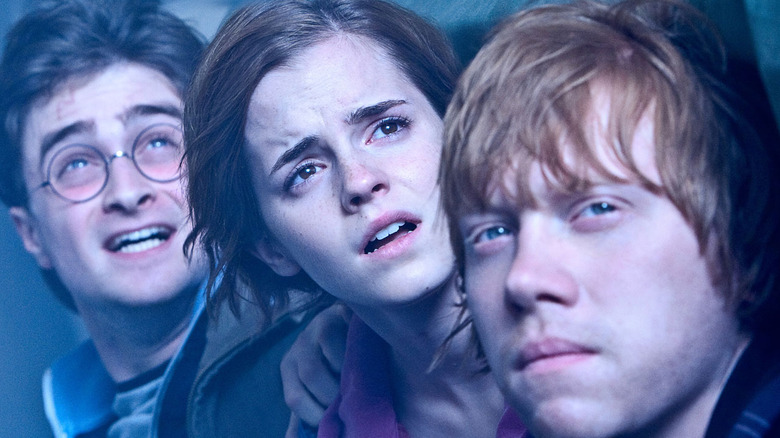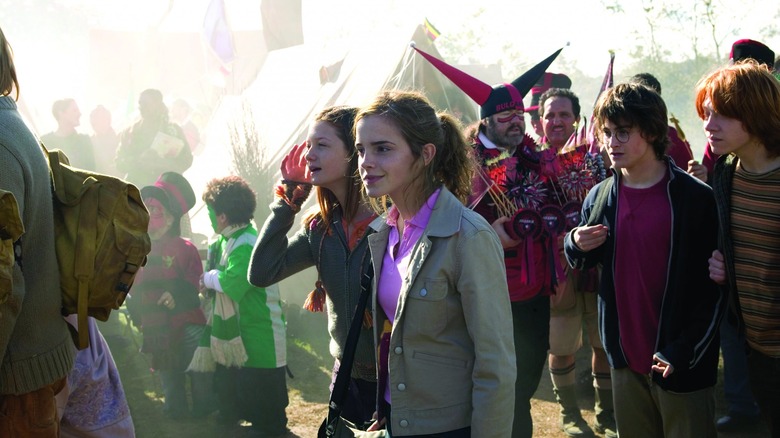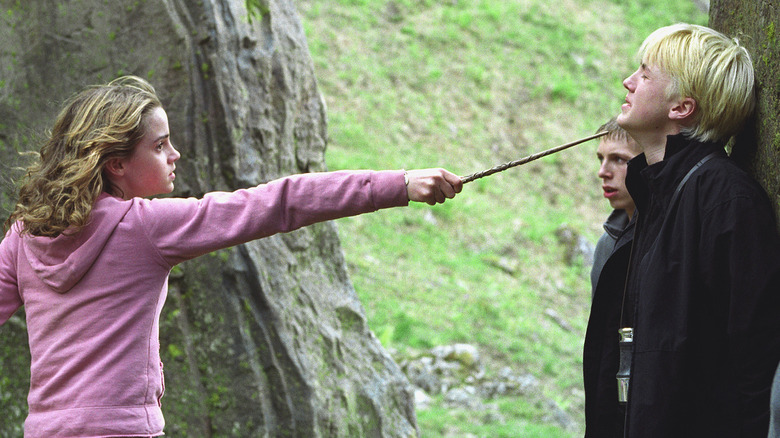The Muggle Theory That Changes Everything About Harry Potter
The Wizarding World exists in secret. That much is made clear early on in the "Harry Potter" series, and the conflict that exists between wizards and non-magic users (known as Muggles) is a constant focus throughout all seven of the "Harry Potter" books, the eight film adaptations, and the ongoing "Fantastic Beasts" film franchise. However, despite how integral the rift between the magical and Muggle communities is in the "Harry Potter" series, neither the books nor the movies go all that in depth into the history of the conflict between the world's magical and non-magical citizens.
In fact, the "Harry Potter" series more or less leaves the details of the relationship between the muggle and wizarding societies to the imagination. The series refers to a handful of real-life historical events, like the Salem Witch Trials and the first and second world wars, in passing from time to time, but it doesn't dive too deeply into how the wizarding community eventually achieved the secret existence that it maintains throughout the "Harry Potter" and "Fantastic Beasts" franchises.
One popular "Harry Potter" fan theory, however, offers up a game-changing explanation for the relationship between the Muggle and wizarding communities. Here's the theory about Muggles in "Harry Potter" that could change everything.
The Muggles vs. Wizards conflict in Harry Potter could be more complicated than fans think
One Reddit user believes that the reason wizards were forced into hiding is because they lost a war with Muggles hundreds of years prior to the events of the "Harry Potter" series. This Redditor speculates that there may have been a war between wizards and Muggles at some point during the Middle Ages and the Muggles, somehow, emerged as the victors.
That defeat could, therefore, be what led the wizarding community to not only live in secret, but also in legitimate fear of Muggles. It may even explain why the Minister of Magic, as established in both "Harry Potter and the Goblet of Fire" and "Harry Potter and the Half-Blood Prince," must keep the British Prime Minister up to date on all matters within the Wizarding World. That is to say that the Minister doesn't necessarily do it out of courtesy, but because it's been a requirement ever since the Muggles scored their decisive victory over wizards centuries prior.
It's a compelling theory, and one that totally redefines the perceived power balance between the wizards and mMggles of the world. It raises the possibility that Muggles may have been far more capable of taking on wizards in the Middle Ages than most "Harry Potter" fans would likely assume — just in case the relationship between the wizarding and Muggle communities wasn't already fascinating enough.
Relations between Muggles and wizards are definitely strained
If this theory is true, it would certainly explain some elements of the oddly strained between Muggles and wizards, including the bizarre arrangement that involves the sitting Minister of Magic stepping through a painting to check in with the current British Prime Minister (an event detailed in the opening chapter of "Harry Potter and the Half-Blood Prince," though it doesn't appear in the films). Beyond that, it might also explain why wizards go to such extreme lengths to hide themselves from their non-magical brethren.
Throughout the series, readers and audiences learn that wizards cast spells more or less constantly to cover their tracks from Muggles, whether they're hiding entire castles — like Hogwarts — or dressing in regular Muggle clothing at the Quidditch World Cup to look less suspicious. Even so, wizards take a lot of risks by stationing important buildings like St. Mungo's Hospital for Magical Maladies and Injuries or vital passageways like the pub that leads to Diagon Alley right in the middle of London — though they seem to bank on the fact that Muggles just don't notice. As the Knight Bus conductor Stan Shunpike tells Harry in "Prisoner of Azkaban," Muggles don't see the super-fast, shape-shifting bus moving at warp speeds throughout London because they simply aren't paying attention.
The magical prejudice against Muggles could be war-related
There's another element of the wizarding world that could definitely explain the ongoing animosity between Muggles and wizards: specifically, the belief by certain sects of wizards that Muggleborn wizards are inferior. Muggleborns — meaning witches and wizards born to non-magical parents who unexpectedly show magical abilities — are equally as powerful as their pureblood brethren, as witches like Lily Potter and Hermione Granger (Emma Watson) handily prove. However, pureblood purists like Draco Malfoy (Tom Felton) often level slurs like "Mudblood" against their Muggleborn and "half-blood" counterparts (Daniel Radcliffe's Harry, the son of a pureblood and a Muggleborn, is a half-blood). Don't worry — Hermione gets her revenge against Draco time and time again.
This absurd prejudice could be related to a war in which Muggles bested wizards; perhaps ancient wizarding families like the Malfoys are still bitter that their non-magical counterparts somehow beat them in battle. Obviously, none of this has ever been confirmed in the series, but it's always fun to wonder if, at one point, Muggles scored a huge victory over a bunch of super-powerful witches.



